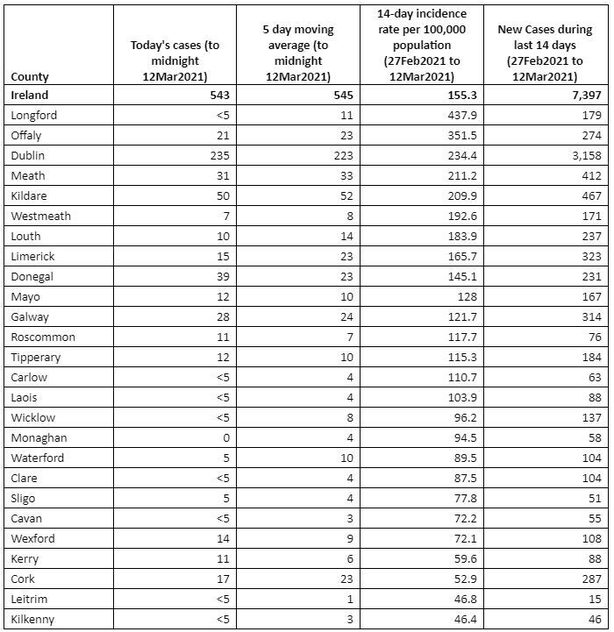The Department of Health has been notified of 16 further deaths associated with Covid-19 and an additional 543 cases.
Three of the deaths occurred in March, 12 in February and one in January. The latest deaths bring the total number of Covid-19 related deaths in Ireland to 4,534.
The median age of those who died was 88 years and the age range was 59-96 years.
Of the new cases notified today, 269 are men and 271 are women. It brings the total number of confirmed cases to 226,358.
Of today's cases, 73% are under 45 years of age and the median age is 29 years old.
The national breakdown is: 235 cases in Dublin, 50 in Kildare, 39 in Donegal, 31 in Meath, 28 in Galway and the remaining 160 cases are spread across 20 other counties.

Latest figures show that as of 8am this morning there were 340 people hospitalised with Covid-19 in Ireland.
There were 15 new admissions over the previous 24 hours (8am to 8am), while 22 people were discharged during that same period.
The number of people in intensive care is down two to 85.
As of 10 March, 570,391 doses of Covid-19 vaccine have been administered in Ireland: 409,662 people have received their first dose and 160,729 people have received their second dose.
In Northern Ireland, one further coronavirus-related death has been recorded there, taking the official Department of Health toll to 2,098.
There are 146 new cases from tests on 1,473 individuals.
There are 180 confirmed Covid-19 patients in hospital, with 24 in ICU, 18 of whom are on ventilators.
The average seven-day infection rate for Northern Ireland is 69.6.
The area with the highest rate remains Mid Ulster on 88.1, and the lowest remains Fermanagh and Omagh on 38.5.
We need your consent to load this rte-player contentWe use rte-player to manage extra content that can set cookies on your device and collect data about your activity. Please review their details and accept them to load the content.Manage Preferences
Meanwhile, the roll out of the Covid-19 vaccination programme continues this weekend and will target medically vulnerable people, who will be visited by community vaccination teams.
The roll out of second dose vaccinations for residents and staff in long-term residential institutions will also continue.
Among the medically vulnerable to get their vaccinations are people with certain intellectual disabilities, including Down's syndrome.
Hospital-based vaccinations for other medically vulnerable people will also continue.
In addition, vaccinations for dentists, pharmacists and other private healthcare providers will also take place this weekend.
Elsewhere, the HSE has informed GPs that first dose vaccinations for people aged 75 to 79 years old will be limited next week, to ensure that as many people as possible in older age groups are vaccinated before moving on to this lower age group.
The HSE also expects to progress arrangements to get vaccines to the remaining 30 GP practices that have been unable to "buddy-up" with larger practices for the vaccination programme.
It is expected that 10% of the adult population will have received a first dose, while 4% will have received a second dose vaccination, by the end of this weekend.
HSE Chief Executive Paul Reid has said that the supply of vaccines "will improve", but welcomed the fact that 600,000 doses had been administered.
The Minister of State for Mental Health and Older people has said the Ireland "is still on track" to have all over 70s vaccinated by mid-May with the supplies they have received to date, despite disruption from AstraZeneca.
Speaking on RTÉ's Saturday with Katie Hannon programme, Mary Butler said the vaccine roll-out programme has to adapt as quickly as possible, "almost daily", to the various challenges to supply.
Ms Butler said even though the over-80s are the priority again this week, it was "still in line" with the Government's prioritisation schedule, adding that 99% of those over 85 have been vaccinated, except for some who are housebound.
Ms Butler said some GPs have started to move to the 75-79 age group, as they had the capacity to do so and the vaccines to do so.
Ireland 'still in the thick of it', says O'Neill
A leading immunologist has urged people not to let their guard down, as Ireland is "still in the thick" of its fight against Covid-19.
Speaking on RTÉ's Brendan O'Connor programme, Professor Luke O'Neill expressed concern over the fact that there has been a slight trend upwards in terms of daily figures, at a time when not as many vaccine doses have been administered as the country would like.
Prof O'Neill said there is "really good evidence" that suggests a 90% fall in deaths and hospitalisations come May, due to the level of vaccines administered by that stage, pointing to Israel as an example.
He said the two key milestones to try to reach are to protect the elderly and protect the vulnerable, adding that herd immunity will take "months and months and months" to achieve, and so those most vulnerable and elderly should be vaccinated as soon as possible.
Additional reporting: George Lee

